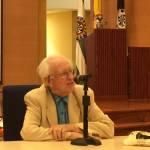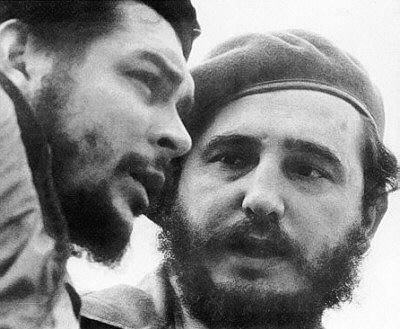50 Years of Fidel
EDITORIAL, 3 Mar 2008
#1 | Johan Galtung - TRANSCEND Media Service
Late 1958, 50 years ago, the revolution won, Batista fled, Fidel and his brother Raúl entered Habana early 1959. The rest is history. Castro’s resignation as President is a mini-event.
He has put his mark on the history of Cuba, Latin America, the whole world. He has survived politically 10 US presidents (5 even serving more than one term, 6 also biologically), all out to intervene, invade, kill him, this Fidel, this faithful, who, hopefully, one day will write a comparative presidentology:
- Eisenhower 1957-1960
- Kennedy 1961-1963 – killed
- Johnson 1963-1964; 1964-1968
- Nixon 1969-1972; 1973-1974 – resigned
- Ford 1974-1976
- Carter 1977-1980
- Reagan 1981-1984; 1985-1988
- Bush Senior 1989-1992 (father-son, not brother-brother)
- Clinton 1993-1996; 1997-2000
- Bush Junior 2001-2004; 2005-2008 (?, the end is not known)
I met Fidel three times, mainly for interviews. He did the talking: intense charisma, rock-bottom knowledge, faith; knowing his enemy better than vice versa. He did not have Che Guevara’s charm, another, but failed, giant. What makes Castro so great?
Not only that he stood up, for 50 years, against the formidable US Empire, one of the worst in terms of exploitation, killing, arms-twisting and brain-washing in human history. He practiced an alternative, imperfect, but then nothing is.
The alternative was primacy to basic needs, the bienes fundamentales of food, clothing, housing, health, education, at a basic level, starting with the most needy, liberating them from misery. Of freedom to choose ruling party and goods, also a basic need, there was little. Of identity, another basic need, there was more when it became easier to be Catholic. Of the need to survive there was much: Cuba is not violent, unlike the USA.
US-led mafias had come far in the process of converting Cuba into a casino with brothel for US entertainment. Just to liberate those girls, mainly black, giving them education and jobs, was already something. The white Habana bourgeoisie had their pre-lunch cakes flown in from Miami. Already June 1960, traveling up and down Cuba: anyone black, woman and young was pro-Castro; most of the white, male, older Cubans were anti.
And so it stayed. The underlying conflict is not only over what the US believes and the West mimics, anti-yanqui’ism and anti-capitalism. It is also black vs white, and woman vs man.
I remember an early morning during one of my numerous visits, in 1998, when it suddenly struck me that I was the only white around. That day a Cuban black had another narrative:
Yes, Fidel and his revolution are an important episode in the history of Cuban liberation. But this has lasted centuries, basically as anti-slavery and black against white, first against Spain, José Martí, then against USA, Fidel Castro, then–He paused. The whites are in Miami. Some are still in Cuba, the Castro brothers among them. Could they have a shared interest talking less about elections? They understand, Washington not.
Fidel sacrificed some needs for others, and was punished. It would have been better had he not. I remember proposing in 1973 to members of the Politburo a two-party system, like up North, not one right and one extreme right, but two left wing, say, socialist and communist. And then debate, space, voice!
Fidel also sacrificed normal Western standard of living for the well-to-do, for today’s Millennium Goals for the masses. I suggested more freedom for small enterprises for daily comfort. The argument against both was the proven “bourgeois spirit” of elections and small business. Maybe, but then prove, do not impose, the superiority of a socialist spirit of solidarity.
The West will be harping on free elections and markets, unaware of other goals. The USA might have met these goals had it not been for criminal and stupid economic sanctions; criminal being against an overwhelming UN majority, stupid being counter-productive. General sanctions strengthen regimes, and Cuba is no exception. Consumer goods are stronger arguments against austere socialism than a hostility hitting everybody. They could have drowned socialism in macdonalds. But — eviva estupidez! — What Fidel has proved is earth-shaking: basic needs for all is possible. But there is a condition, some system change.
What happened, except sharing poverty? Four major things.
Sanctions hit economy, stifle politics, encourage military, but the culture is free to blossom, unimpeded by consumerism. First, the arts cost little and have been blossoming for artists, performers and consumers alike, to unknown heights.
Second, if you cannot process matter, process human beings instead, make education at ever higher level available for all; graduate, post-graduate, post-doctoral. The sky is the limit.
Third, a major change in foreign policy from Che’s one-two-three Vietnams to one-two-three thousand physicians with medical tools in their backpacks, helping people in the slums all over Latin America with eye operations and so on, letting Venezuela pay Cuba with oil and the others pay Venezuela?
Fourth, a new basic needs oriented economy, bypassing World Bank/IMF, in front of the closed eyes of the USA and the West trying to bring democracy to Iraq and Afghanistan by pouring water with one hand and shooting with the other.
Who will win? The faithful one, Fidel; also because he is more capable of change than the West. And there is more to come.
_____________________________________
 Johan Galtung, a professor of peace studies, dr hc mult, is founder of the TRANSCEND Network for Peace, Development and Environment and rector of the TRANSCEND Peace University-TPU. Prof. Galtung has published 1670 articles and book chapters, over 450 Editorials for TRANSCEND Media Service, and 167 books on peace and related issues, of which 41 have been translated into 35 languages, for a total of 135 book translations, including ‘50 Years-100 Peace and Conflict Perspectives,’ published by the TRANSCEND University Press-TUP.
Johan Galtung, a professor of peace studies, dr hc mult, is founder of the TRANSCEND Network for Peace, Development and Environment and rector of the TRANSCEND Peace University-TPU. Prof. Galtung has published 1670 articles and book chapters, over 450 Editorials for TRANSCEND Media Service, and 167 books on peace and related issues, of which 41 have been translated into 35 languages, for a total of 135 book translations, including ‘50 Years-100 Peace and Conflict Perspectives,’ published by the TRANSCEND University Press-TUP.
This article originally appeared on Transcend Media Service (TMS) on 3 Mar 2008.
Anticopyright: Editorials and articles originated on TMS may be freely reprinted, disseminated, translated and used as background material, provided an acknowledgement and link to the source, TMS: 50 Years of Fidel, is included. Thank you.
If you enjoyed this article, please donate to TMS to join the growing list of TMS Supporters.

This work is licensed under a CC BY-NC 4.0 License.
